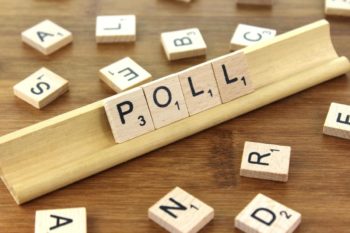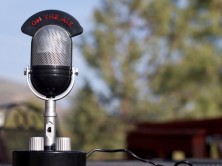
(Credit: http://nyphotographic.com/)
A recent New York Times article reports that many Americans feel confused about the myriad of conflicting stories reported in the news media about impeachment and other controversial matters. With the headline, “‘No one believes anything’: Voters worn out by a fog of political news,” the article goes on to note:
“Paying attention to the impeachment inquiry and other developments means having to figure out what is true, false or spin. Many Americans are throwing up their hands and tuning it all out.”
Bolstering the report is a new poll by AP/NORC showing that close to half of all Americans believe it’s difficult to know whether the information they get in the news is even true. The poll also finds that about four in ten Americans have little or no trust in the various sources of news.
Contrasting that picture of a confused and bewildered public is separate new poll by ABC/Ipsos that reports a very decided American public, with 95% expressing a fixed view about President Trump and impeachment.
The poll details suggest that 70% of Americans believe that Trump was “wrong” in his dealings with Ukraine, while 25% disagree. Just 5% have no opinion.
What seems rather implausible about those poll results is the small percentage of Americans who supposedly have no opinion. The poll reports that more that four in ten Americans (42%) have not been following the impeachment hearings either very or even “somewhat” closely. That would align with the AP/NORC poll suggesting many people tuning out.
So, how then does the ABC/Ipsos poll find so many decided Americans when it comes to whether Trump has done anything wrong in his dealings specifically with Ukraine, and whether he should be impeached?
Manufacturing Public Opinion
Here is how ABC/Ipsos addressed the question of Trump’s behavior and possible impeachment, and thus created the illusion of a settled public opinion:
Q1: How closely have you been following the hearings in the House of Representatives about whether or not President Trump should be impeached for his actions related to Ukraine?
Very closely [21%]
Somewhat closely [37%]
[Total “closely” 58%]
Not too closely [24%]
Not closely at all [18%]
[Total “not closely” 42%]
Q2: When it comes to the recent impeachment hearings, which one of the following statements comes closest to your point of view?
President Trump’s actions were wrong and he should be impeached by the House and removed from office by the Senate [51%]
President Trump’s actions were wrong and he should be impeached by the House but NOT removed from office by the Senate [6%]
President Trump’s actions were wrong, but he should NOT be impeached by the House or removed from office by the Senate [13%]
President Trump’s actions were NOT wrong [25%]
Skipped [4%]
Note that in Q2, there is no suggestion that a respondent could say “I’m unsure” or “I don’t know.” The respondent could “skip” the question, but that’s not the same as having the opportunity to explicitly acknowledge ambivalent feelings.
This technique of asking questions is referred to by pollsters as “forced-choice.” When the question does not offer an option of “unsure,” respondents are pressured to come up with a response whether or not they really have one.
In general, the media do not like to report that, say, 40% of the public has tuned out and has no opinion on whatever issue is being polled. Yet, the reality of public opinion is that, as the AP/NORC poll suggests, many people are not engaged in day-to-day politics.
To understand what the public is really thinking, it is just as important to know how many people are unengaged in an issue as it is to know how many of those who are engaged support or oppose the issue.
Here is an alternative way to ask the public about Trump and impeachment:
Q1 – How closely have you been following the news about President Trump’s actions with respect to Ukraine – very closely, somewhat closely, not too closely, not closely at all?
In the above question, the focus is on Ukraine, and there is no mention of impeachment. Mentioning impeachment would put the next question in the context of something bad, leading the respondents in a negative direction.
Q2 – Do you think President Trump’s actions with respect to Ukraine were wrong or not – or are you unsure?
Note that because nothing has been mentioned about impeachment, the question about Ukraine is not tainted. Also, it’s important in measuring public opinion to understand how many people genuinely don’t have an opinion on the matter. If desired, a follow-up could ask the respondents if they “lean” toward believing Trump’s actions were wrong or not wrong, to get a different feel for the public’s top-of-mind response. But initially, it’s important to measure non-opinion as well as opinion.
Q3 – [Asked only of people who said “wrong” or “unsure”]
Because of his actions with Ukraine, do you think President Trump should be impeached and removed from office, impeached but not removed from office, or not impeached at all – or are you unsure?
Note again the tag line, “or are you unsure?”, which gives the respondents “permission” to admit that they may not yet have formed an opinion on impeachment.
The point of separating the “wrong or not wrong” question from the impeachment question is to avoid the double-barreled problem. In the ABC/Ipsos poll, there were three responses that said Trump was wrong, and one that said he wasn’t. That imbalance could cause some low-information respondents to be pressured to choose a “wrong” option, because of the forced-choice nature of the question.
It’s quite likely that even with the alternative approach to measuring public opinion, as just outlined, more people would say that Trump’s actions were wrong than not wrong. But it’s also quite likely that a significant percentage of the public really is unsure. Similarly, there must be a significant percentage of the public that is uncertain as to whether Trump should be impeached and removed from office. But you wouldn’t know it from the ABC/Ipsos poll.
Instead we have the myth of a fully informed and decided public, unencumbered with doubts and confusion over what’s really true. This “rational” public may serve the interests of the news media, which likes simple stories where the public (a majority) favors one side or another. It’s not as interesting, from a journalistic point of view, if polls were to show that only a plurality of the public is on one side or the other, while a substantial part of the public doesn’t care enough to be engaged.
But giving the public a misleading view of itself hardly serves the interests of truth, or of understanding the actual nature of a democracy.







I have watched the majority of the impeachment hearings since the beginning of the televised hearings. I have also sampled the reporting by several media outlets. I studied journalism as a Communications major in college and the idea that there are any ethics left in mainstream media coverage is doubtful. I was a registered Democrat for 28 years. I changed my registration to Independent in 2016. The one true takeaway that I have after these impeachment hearings is that “FAKE NEWS” is very much a real issue in our country. The blurring of lines between facts, opinions and spin is all but indistinguishable. I long for the days of Cronkite, Jennings, Brokaw and Sawyer- when news was almost exclusively the facts, unnamed or anonymous sources were rarely used and we the viewer/reader were allowed to formulate our own opinion. Case in point – the coverage of the Michael Cohen hearings before Congress – CBS news outlets referred to Michael Cohen as “Trump’s former attorney”, while ABC referred to Mr. Cohen as “Trump’s fixer”. The media coverage or “bias” of the impeachment hearings has been even more egregious. It will be a long time, if ever , that this divided nation believes in the media or many of our government institutions again. True journalism has all but been snuffed out by agendas and the narratives that support them.